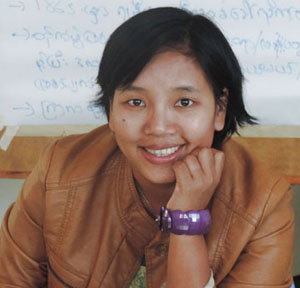Many days after Win Tin’s death, I am still emotional. Deep in my heart, there is a heavy sadness and a sense of great loss. I felt this when my father passed away in 2013, and I still miss my wise grandfather, who died in 1989. Now I feel this new grief after losing another male role model. Although Uncle Win Tin was not a blood relative, I knew him well because we were neighbors, and I had the pleasure of seeing him almost every day for the past year.
When I moved back to Burma in early 2013, it was challenging to find an affordable, decent apartment. Like many dissidents who were able to return home due to the limited political freedoms guaranteed by President Thein Sein’s government, I was dismayed by the rising housing and hotel costs. Over three weeks, my partner and I went from downtown to the suburban areas of Rangoon. The prices downtown were shocking. We found some cheap apartments, but their dirty and dark conditions made me feel sick. They were not adequate for the health of human beings. This is a common experience for many who are not originally from Rangoon. After three weeks of hunting, however, we finally found a place that felt like home.
A few weeks later, a taxi driver asked where I lived and I told him Yankin, the township. “Oh, that’s where the collection of people often began,” he said. I had no idea what he was referring to, so I asked him to elaborate. Until recently, he said, the authorities had arrested dissidents from Yankin areas first, before continuing to detain those in other parts of the city. I started to question myself, wondering why I had instinctually gravitated toward a home there.
Not long after that, a friend who was visiting me pointed at a nearby wooden home and said, “It’s Uncle U Win Tin’s house.” I began to see the full picture of my conversation with the taxi driver. I realized that Win Tin, the veteran journalist and famous Burmese democracy activist, was my neighbor, and I felt good because I knew I could ask him for wise advice one day.
I waited too long for that day, and now I am too late to ask him questions about the future of our country. Last month, Win Tin died of organ failure at the age of 84, after checking into a hospital in Rangoon several weeks earlier.
Even if I never asked for advice, I took strength from his nearby presence before he died. It was pleasant to see him receiving visitors in the morning at his home. In the late afternoon, I often observed him reclining on a chair, watching BBC or a football match on television, and I told myself, “He is alive,” and that gave me comfort. He did not know me, but I knew him from a distance. Whenever I looked at his home and saw him, I whispered a prayer that he would live long.

I like older people because I can sense their vast wisdom and irreplaceable life experiences. I particularly like to have conversations with older men because it reminds me of talking with my late grandfather, who taught me about politics. He was a village headman who resisted when authorities imposed arbitrary and unfair taxes on the villagers, and he carefully dealt with military intelligent officers who showed up in our village without notice to ask for information about the people’s movement.
On the day my grandfather died, he attended a village track council meeting. He forced himself to go, despite his deteriorating health, because the military government was preparing to cut social services for poor families, including rations of rice, cooling oil, salt and other basic subsidies that had been provided under Gen. Ne Win’s socialist program.
There are so many questions that I wish I had asked my grandfather. I wish I had asked about his dreams for the future of our country, about our true ethnic Chin history, and about life under Ne Win’s regime. But I was too young. Still, I have fond memories of him. I remember his smile, the way he spoke with young people and children, and his calm yet steadfast determination to stand up for his fellow citizens.
The memories of these two wise men, my grandfather and Win Tin, have left me with my own sense of determination, as well as frustration. I am determined to work even harder to achieve the change that the old men fought for, although it won’t be easy. This country has been ruled by imprudent people for so long, and these rulers have not resolved the economic, social and political problems that affect the everyday lives of the people. So far, Thein Sein’s government has smoothed international relations by releasing political prisoners, starting ceasefire negotiations with ethnic armed groups, and tolerating some degree of political activities and freedom. Yet nothing substantial has changed.
In conflict areas, lives are still at risk, and the futures of tens of thousands of people remain uncertain. Even in places where there is no conflict, communities are forced to deal with other problems, including the rising prices of commodities, poor health and education services, unemployment, low wages, a lack of market for farm products, land-grabbing, child labor, trafficking, arbitrary taxation and a dysfunctional judiciary system. Adding to these concerns is the increasing gap of wealth between ordinary people and the well-connected handful of lawmakers dominating Parliament.
During the four-year reform process, the government has been unwilling or unable to resolve these problems. I am frustrated because these two wise men who meant so much to me will not see the changes they fought for and dreamed of. But their spirits will be with us in this journey.
Cheery Zahau is a human rights activist from Chin State.
















